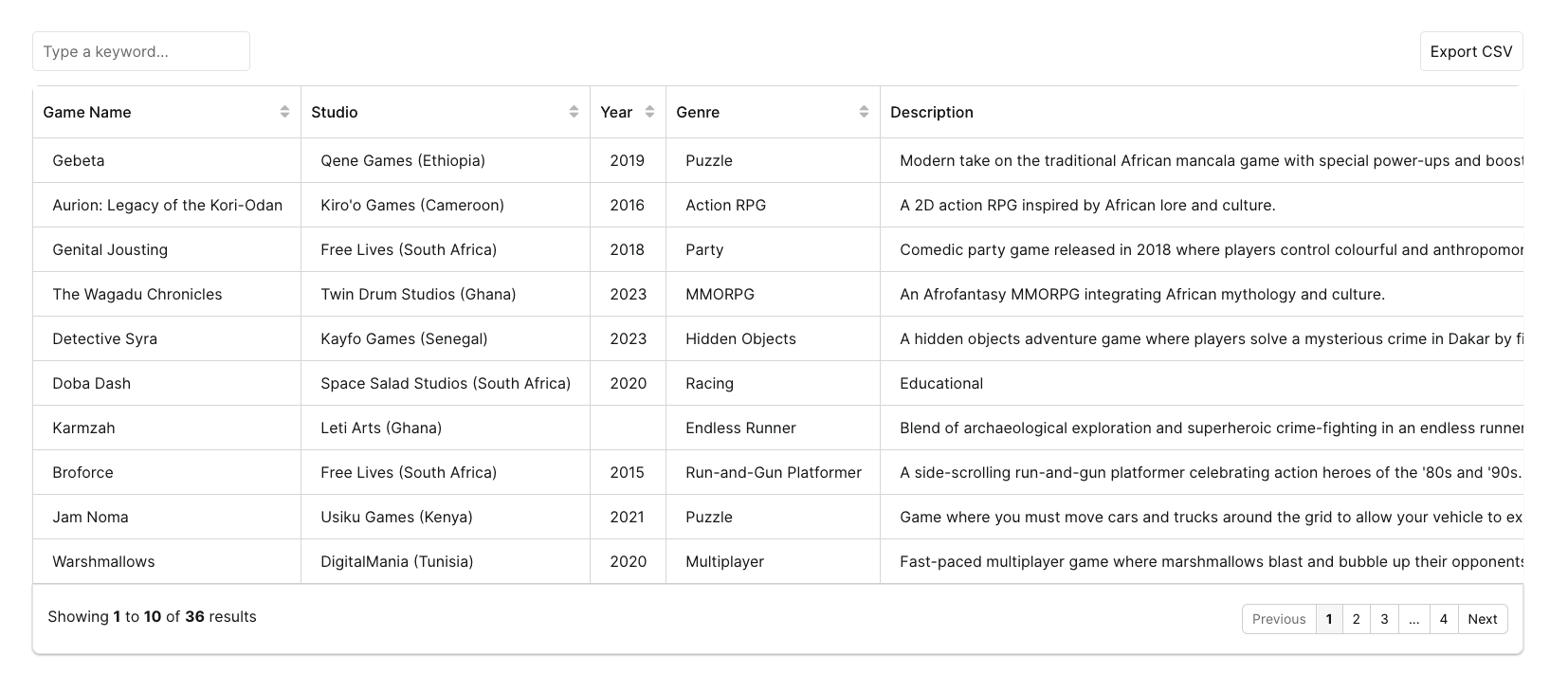
As part of efforts to further understand the games ecosystem in the African context, we put together a database listing notable games developed and produced within the continent.
The African Digital Games Database is a collection of games made by African studios and indie developers that includes information on Studio or Developer Name, Year of Release, Genre, a brief Description of the Game and a link to play the game.
Access the full database here.

We wanted to take things one step further to do a broad analysis of the types of games in the market as well as to explore gaps and opportunities.
At a Glance
1. Diverse Game Genres
Based on the range of genres documented, from Action RPG, Puzzle-Platformer, Action, Adventure-Platformer, and Run-and-Gun Platformer, it is evident that African game developers are exploring a wide range of gaming experiences.
2. Themes and Inspiration
Many studios aim to develop games that take into account local context, history, cultures and lore. A number of popular games set out to achieve this objective. For example, Aurion: Legacy of the Kori-Odan and the Wagadu Chronicles explicitly draws from African traditions and Afrofantasy, and Mzito aims to purge corruption from ancient Africa, reflecting socio-political themes.
3. Types of Games
Many new studios release endless runner games as their first product. For example, Gidi Run (Gamsole Studios), Karmzah (Leti Arts), Kukulu (Qene Games), Da’Karapid (Kayfo Games), Aboki Run (Nigeria) and Tunis 2050 (DigitalMania) are endless runner games. A recent attempt at an MMORPG, The Wagadu Chronicles, unfortunately came to an abrupt end when the game was discontinued six months after its launch.
4. Platform and Accessibility
Games seem to be accessible either via PC (on Steam or Itch.io) or/and on mobile. For example, Broforce, a side-scrolling platformer, Nyamakop, a puzzle-platformer with a unique deformable environment mechanic and HotBunz, a 2D platform game, are all available on Steam. All three games are made by different studios in South Africa and there seems to be a higher likelihood for South African studios to publish games on Steam. Puzzle games such as Gebeta and Africa’s Legend and several endless runner games such as those mentioned above are available on mobile. The game Gidi Run seems to have exclusively been available on MTN Game+ and was downloadable via a text message to a shortcode. Several games, particularly those built with HTML5, are directly accessible through the publisher platforms of Kayfo Games and Usiku Games.
Gaps and Opportunities
1. Missing Game Types
Simulation and Strategy Games
There are few simulation (e.g., city-building, farming simulators) and strategy games (e.g., real-time strategy, turn-based strategy). These genres often have a dedicated global fanbase.
Sports Games
Despite the immense popularity of sports like football across Africa, there is a lack of sports games in the dataset. Developing sports games that reflect local leagues, teams, and players could capture a significant audience.Cozy and Narrative-Driven Games
Story-rich games like visual novels, interactive dramas, or adventure games that focus on storytelling and character development are underrepresented. Cosy games are also underrepresented. This is a genre that emphasises relaxation, comfort, and a low-stress environment. They often feature calming gameplay mechanics, charming art styles, and soothing soundtracks. Common elements include farming, crafting, exploration, and light-hearted storylines, which allow players to unwind and enjoy a zen gaming experience.
2. Focus on Female Gamers
Research has shown that many female gamers tend to prefer genres like puzzle, casual, simulation, and narrative-driven games. Games could work to feature diverse characters and storylines that reflect the experiences of female gamers. Including strong female protagonists, relatable storylines, and gameplay mechanics that appeal to a broader audience could draw more girls and women to play. Despite common perceptions that most gamers are male, data from the US between 2006-2023 shows that the number of male and female gamers is quite balanced. Given issues with device ownership, data costs, availability of relevant games and disproportionate care burdens, this may not be the case in the African context, however, there is insufficient data to ascertain one way or the other.
3. Accessibility and Devices
Mobile devices are currently more accessible across Africa than laptops and PCs. As such, that makes mobile gaming a crucial area for development. Optimising games for lower-end devices and ensuring they are playable without requiring constant internet access can broaden the reach of games. Refer to our Principles for Digital Play to learn more.
Localisation
Beyond African themes, there’s also a need for localisation of games that includes text translation as well as voiceovers. Translating in-game text, menus, tutorials, and dialogues into multiple African languages can significantly broaden the game's reach. Given Africa's linguistic diversity, offering translations in widely spoken languages such as Swahili, Hausa, Yoruba, Amharic, Zulu can make games more inclusive and popular or can raise revenue by focusing on global markets with French, Spanish, Mandarin or Hindi. Adding voiceovers in local languages could also immersion and relatability.
Last Updated:
June 4, 2024





